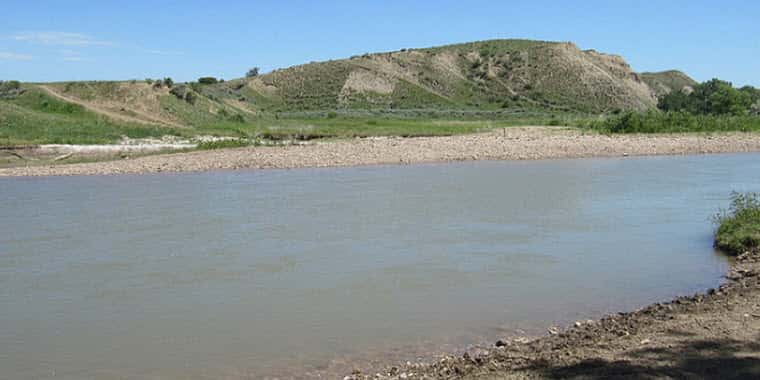A total of 26 states and a group of agriculture interests have renewed the legal fight against the Biden administration’s Waters of the United States (WOTUS) rule, filing amended complaints in federal courts this week aimed at an amended rule finalized in September.
The renewed legal fight is playing out in federal courts in Texas and North Dakota.
After the Supreme Court ruled against EPA in Sackett v. EPA earlier this year, President Joe Biden’s administration finalized an amended rule on Sept. 8, 2023, that removed the use of the significant-nexus test in making Clean Water Act (CWA)determinations — without conducting a public comment period.
NO PUBLIC COMMENT PERIOD PROVIDED
The states argue in an amended complaint filed Monday in the U.S. District Court for the District of North Dakota, that EPA committed several violations of the Administrative Procedure Act, including not providing a public comment period before releasing the amended final rule.
The states are Alabama, Alaska, Arkansas, Florida, Georgia, Indiana, Iowa, Kansas, Louisiana, Mississippi, Missouri, Montana, Nebraska, New Hampshire, North Dakota, Ohio, Oklahoma, South Carolina, South Dakota, Tennessee, Utah, Virginia, West Virginia and Wyoming.
Two other states, Texas and Idaho, have filed a separate amended complaint in the U.S. District Court for the Southern District of Texas.
The states also argue the amended rule violates the Clean Water Act and the Constitution, asking the court to vacate the rule and send it back to the EPA.
“The amended final rule, that is the final rule as modified by the conforming rule, remains riddled with problems,” the states said in the complaint.
NO REASONABLE CONNECTION
The states said the rule includes waters with “no reasonable connection to navigable waters” and is arbitrary and capricious “because, among many things, it embraces vague standards with little justification and minimal consideration of costs.”
The initial lawsuit filed in February asked the court to throw out the Biden rule, claiming the EPA and U.S. Army Corps of Engineers “toppled the cooperative federalism regime” by implementing a rule that is “overbroad and hopelessly vague.”
That initial lawsuit resulted in an injunction against the rule’s enforcement in the 24 states.
“Meanwhile, if the amended final rule is left in place, then ranchers, farmers, miners, homebuilders and other landowners across the country will struggle to undertake even the simplest of activities on their own property without fear of drawing the ire of the federal government,” the states said in the new complaint.
“Landowning Americans of all stripes will thus be left with a choice: fight their way through an expensive and lengthy administrative process to obtain complex jurisdictional determinations and permits or face substantial civil and criminal penalties. The amended final rule’s ambiguous environmental benefits do not justify any of this.”
Two state-level agriculture groups in North Dakota, including the Cass County Farm Bureau and North Dakota Farm Bureau, that intervened in the case on behalf of the states also filed an amended complaint this week.
“The amended rule failed, however, to address numerous other significant flaws in the 2023 rule,” the ag groups said in their complaint.
The ag groups pointed to one example of a problem in the amended rule.
WOTUS DEFINITION
The definition of WOTUS applies the relatively permanent standard to tributaries to traditional navigable waters, the territorial seas, interstate waters or impoundments of WOTUS, intrastate lakes and ponds, streams, or wetlands, and wetlands adjacent to and with a continuous surface connection to relatively permanent impoundments, and wetlands adjacent to tributaries that meet the relatively permanent standard.
Texas and Idaho, as well as a group of agriculture interest groups, have filed their amended complaints against EPA in lawsuits that were first filed in January 2023.
In an amended complaint filed by Texas and Idaho in the U.S. District Court for the District of Southern Texas in Galveston, the states allege the EPA promulgated the final amended rule without allowing public comment.
“They used the Sackett opinion to justify depriving the public and plaintiffs of notice and the opportunity to comment on a rule with nationwide importance,” according to the Texas and Idaho complaint.
Leading up to the drafting of the Biden rule, ag groups and others asked the administration to hold off on the rulemaking until the Supreme Court ruled on the Sackett case.
“The amended 2023 rule maintains the ambiguity of the 2023 rule, leaving those wishing to identify the ambit of federal power over dry land or minor water features at the mercy of an expensive, vague and arbitrary analysis, lest they face a staggering criminal or civil penalty,” the states said.
OTHER INTEREST GROUPS
Also filing an amended complaint in the Texas court was a group of 18 interest groups from the agriculture, oil and housing industries.
The American Farm Bureau Federation is joined in the amended lawsuit by the National Cattlemen’s Beef Association, National Corn Growers Association, National Pork Producers Council, Matagorda County Farm Bureau, Public Lands Council, Texas Farm Bureau and U.S. Poultry and Egg Association, as well as the American Petroleum Institute.
They have asked the Texas court to declare the amended rule unlawful.
“The amended rule fails to remedy the vagueness concerns in the 2023 rule, and thus imposes impossible and unpredictable burdens on landowners, users and purchasers,” the groups said.
“It requires them to assess not only their own land but also vast expanses of land beyond their own holdings, using multiple vaguely defined connections to potentially remote features, in an effort to determine if their land is regulated under the CWA. The consequence is a sweeping and unwieldy regulation that leaves the identification of jurisdictional waters so opaque, uncertain and all-encompassing that plaintiffs and their members and clients cannot determine whether and when the most basic activities undertaken on land will subject them to drastic criminal and civil penalties.”
###
DTN


